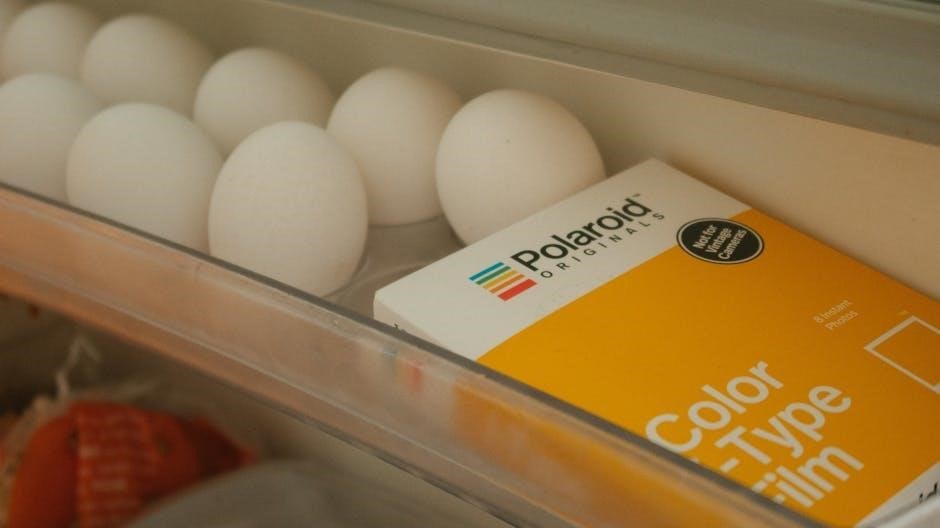Dr. Greger’s Daily Dozen is a simple, evidence-based checklist from his book How Not to Die. It guides daily food choices for optimal health, featuring a free app and printable PDF to track progress.
Overview of the Daily Dozen Checklist
Dr. Greger’s Daily Dozen Checklist is a straightforward guide to ensuring a balanced and nutrient-rich diet. It outlines 12 food groups with recommended daily servings, such as beans, cruciferous vegetables, and whole grains. The checklist is designed to be simple and practical, helping users track their intake of essential foods. It emphasizes variety and portion sizes, making it easier to meet nutritional goals. Available as a free app or printable PDF, the checklist is a handy tool for anyone aiming to adopt a healthier lifestyle. By focusing on whole, plant-based foods, it encourages sustainable eating habits that support long-term health and well-being.
Importance of the Daily Dozen in a Healthy Diet
Dr. Greger’s Daily Dozen plays a crucial role in ensuring a balanced and nutritious diet. By focusing on 12 key food groups, it helps prevent nutrient deficiencies and promotes overall health. The checklist emphasizes whole, plant-based foods, which are rich in vitamins, minerals, and antioxidants. Regularly incorporating these foods supports energy levels, immune function, and chronic disease prevention. The Daily Dozen also encourages mindful eating and portion control, making it easier to maintain a healthy lifestyle. Its simplicity and accessibility make it a valuable tool for anyone seeking to improve their diet and reduce the risk of long-term health issues.

Components of the Daily Dozen
The Daily Dozen includes 12 essential food groups: beans, cruciferous vegetables, other vegetables, fruits, nuts, seeds, whole grains, herbs, and spices, plus exercise and considerations.
Beans: Servings and Benefits
Dr. Greger recommends at least three servings of beans or legumes daily. Beans are rich in protein, fiber, vitamins, and minerals, supporting heart health and digestion. They help lower cholesterol, regulate blood sugar, and promote satiety, aiding in weight management. Examples include lentils, chickpeas, black beans, and peas. Their high fiber content also supports gut health and reduces inflammation. Incorporating beans into meals is versatile, from soups to salads, making them a cornerstone of a plant-based diet. Regular consumption of beans has been linked to reduced risk of chronic diseases like diabetes and cardiovascular conditions, making them a vital part of the Daily Dozen checklist.

Cruciferous Vegetables: Recommendations and Examples
Dr. Greger advises consuming at least two servings of cruciferous vegetables daily. These vegetables, including broccoli, kale, Brussels sprouts, and cauliflower, are rich in vitamins C and K, fiber, and cancer-fighting compounds like sulforaphane. They support detoxification processes, immune function, and may reduce the risk of chronic diseases. Regular intake has been linked to improved cardiovascular health and anti-inflammatory effects. Incorporating a variety of these vegetables ensures a broad range of nutrients and health benefits. Adding them to meals or snacks, such as salads or steamed dishes, makes reaching the daily goal achievable and flavorful. Their versatility makes them a key component of a balanced diet.
Other Vegetables: Daily Serving Sizes
Dr. Greger recommends consuming at least two servings of other vegetables daily. These include non-cruciferous varieties like tomatoes, cucumbers, and sweet potatoes. These vegetables are rich in vitamins A and C, potassium, and antioxidants, which support immune function and overall health. They also provide fiber, aiding digestion and satiety. Examples of other vegetables include leafy greens like spinach, bell peppers, and zucchini. Incorporating a variety ensures a broad intake of essential nutrients. These vegetables can be easily added to salads, soups, or stir-fries, making it simple to meet the daily goal. They play a vital role in maintaining a balanced diet and promoting long-term well-being.
Fruits: Variety and Serving Guidelines
Dr. Greger recommends at least three servings of fruit daily, emphasizing variety to maximize nutrient intake. Berries, such as blueberries and strawberries, are highlighted for their high antioxidant content. Other fruits like bananas, apples, and citrus varieties provide essential vitamins, minerals, and fiber. Fruits support heart health, immune function, and digestion. Aim to include a mix of colors to ensure a broad range of vitamins and minerals. Fresh, frozen, or dried fruits are all acceptable, but avoid sugary juices. Incorporating fruits into meals, snacks, or smoothies makes it easy to meet the daily goal. Variety ensures a balanced intake of nutrients for optimal health.

Nuts and Seeds: Health Benefits and Portions
Nuts and seeds are essential in Dr. Greger’s Daily Dozen, offering numerous health benefits. They are rich in healthy fats, protein, and fiber, supporting heart health and satiety. One ounce (about a small handful) is the recommended daily serving size. Almonds, walnuts, chia seeds, and flaxseeds are excellent choices, providing omega-3s and antioxidants. They reduce the risk of heart disease and may aid in weight management. Incorporate a variety to ensure a broad range of nutrients. Portion control is key, as they are calorie-dense. Adding nuts and seeds to meals or snacks is a simple way to meet the daily goal and enhance overall nutrition.

Whole Grains: Importance and Serving Suggestions
Whole grains are a cornerstone of Dr. Greger’s Daily Dozen, emphasizing their role in providing essential nutrients like fiber, vitamins, and minerals. Aim for three servings daily, such as brown rice, quinoa, or oats. Whole grains support heart health, digestion, and blood sugar control. They are rich in antioxidants and phytochemicals, which help protect against chronic diseases. Incorporate them into meals by swapping refined grains for whole grain options. Pair whole grains with vegetables or plant-based proteins for balanced, nutritious meals. Tracking your servings with the Daily Dozen checklist ensures consistency. Making whole grains a priority enhances overall dietary quality and promotes long-term health benefits.
Herbs and Spices: Their Role in the Daily Dozen
Herbs and spices are included in Dr. Greger’s Daily Dozen for their potential health benefits. They add flavor without calories, salt, or sugar, enhancing meals naturally. Many herbs and spices, like turmeric and cinnamon, are rich in antioxidants and anti-inflammatory compounds. While they are not calorie-dense, they contribute to a balanced diet by boosting nutrient intake and supporting overall well-being. The Daily Dozen encourages incorporating a variety of herbs and spices to diversify flavors and maximize their health-promoting properties. Tracking their use with the checklist or app helps ensure consistency and makes meal preparation more mindful and nutritious. Their role is to complement other food groups, enhancing both taste and health benefits.
Exercise: Incorporating Physical Activity
Dr. Greger emphasizes the importance of regular physical activity as part of the Daily Dozen. He recommends a combination of moderate and vigorous exercises, such as brisk walking, cycling, or yoga, to support overall health. Exercise is not just for weight management but also for improving cardiovascular health, boosting mental well-being, and reducing the risk of chronic diseases; The Daily Dozen checklist encourages tracking physical activity alongside dietary habits, ensuring a holistic approach to health. By incorporating exercise into daily routines, individuals can enhance the benefits of a plant-based diet and maintain long-term wellness. Dr. Greger’s approach integrates movement as a key pillar of a healthy lifestyle.

Circumstances: Additional Health Considerations
Dr. Greger’s Daily Dozen acknowledges that individual health needs may vary due to specific circumstances. For instance, pregnancy, allergies, or chronic diseases may require adjustments to the checklist. The app and printable PDF allow users to tailor their goals, ensuring flexibility for personal health conditions. Additionally, certain nutrients may need special attention, such as vitamin B12 for vegans or omega-3s for heart health. Dr. Greger encourages consulting healthcare professionals for personalized advice, especially when managing chronic conditions like diabetes or hypertension. By addressing these circumstances, the Daily Dozen remains adaptable, promoting health equity and inclusivity for diverse populations and needs. This ensures the checklist is both practical and effective for long-term well-being.

Benefits of Following the Daily Dozen
Following the Daily Dozen enhances nutrient intake, supports weight management, and reduces the risk of chronic diseases, promoting overall well-being and long-term health benefits effectively.
Improved Nutrient Intake
Adhering to Dr. Greger’s Daily Dozen ensures a diverse intake of essential nutrients. By incorporating beans, cruciferous vegetables, fruits, and whole grains, the diet becomes rich in fiber, vitamins, and minerals. This balanced approach supports immune function, digestion, and overall health. The checklist emphasizes variety, helping to cover nutritional gaps and promoting optimal energy levels. Regular consumption of these foods provides antioxidants, phytochemicals, and plant-based proteins, which are vital for maintaining bodily functions. The Daily Dozen fosters a habit of mindful eating, ensuring that each meal contributes to better health outcomes. This systematic approach makes it easier to meet daily nutritional needs efficiently.
Weight Management
The Daily Dozen supports weight management by focusing on nutrient-dense, low-calorie foods. Emphasizing beans, vegetables, and whole grains helps reduce overall calorie intake while promoting satiety. These foods are high in fiber, which slows digestion and curbs overeating. The checklist encourages a balanced diet that naturally leads to healthier portion sizes. Regular consumption of fruits and nuts provides essential nutrients without excessive calories. By prioritizing plant-based meals, the Daily Dozen helps maintain a healthy weight, reducing the risk of obesity and related conditions. This approach fosters sustainable weight management through mindful eating and optimal nutrition, aligning with long-term health goals.
Reduced Risk of Chronic Diseases
Adhering to the Daily Dozen significantly lowers the risk of chronic diseases such as heart disease, diabetes, and certain cancers. The emphasis on beans, cruciferous vegetables, and whole grains provides essential nutrients and antioxidants that combat inflammation. Regular consumption of these foods helps maintain healthy blood pressure and cholesterol levels, reducing cardiovascular risks. The checklist also promotes the intake of fiber, which improves insulin sensitivity and supports gut health; By focusing on a variety of colorful fruits and vegetables, the Daily Dozen ensures a broad intake of phytochemicals, which protect against cellular damage and chronic conditions. This balanced approach creates a foundation for long-term health and disease prevention.

Tools to Track the Daily Dozen
Dr. Greger’s Daily Dozen offers a free app and a printable PDF checklist to monitor progress. The app tracks food intake, while the PDF provides a quick visual guide.
The Daily Dozen App: Features and Functionality
Dr. Greger’s Daily Dozen app is a free, user-friendly tool available on iOS and Android. It allows users to track their daily food intake, ensuring they meet the recommended servings for each category. The app provides a checklist for beans, cruciferous vegetables, fruits, and more, offering a visual way to monitor progress. It also helps identify nutritional gaps, suggesting foods to add. Additional features include customizable goals and a library of simple, healthy recipes. The app is designed to make adopting a plant-based diet easier and more accessible, supporting long-term health and wellness.
Printable PDF Checklist for Easy Tracking
The printable PDF checklist is a convenient companion to Dr. Greger’s Daily Dozen. It offers a simple, visual way to monitor daily food intake without needing a smartphone. The checklist outlines each category, such as beans, cruciferous vegetables, and fruits, with clear serving guidelines. Users can easily mark off each serving as they consume them. The PDF is downloadable and can be printed multiple times, making it ideal for meal planning or sharing with family. Its straightforward design ensures that tracking dietary progress is both easy and motivating, helping users stay consistent with their healthy eating goals.

Incorporating the Daily Dozen into Daily Life
Integrating the Daily Dozen into your routine is straightforward with practical meal ideas and time-saving tips; Start by adding beans to meals and cruciferous vegetables to salads for a balanced diet.
Meal Ideas and Snack Suggestions
Incorporating the Daily Dozen into your meals can be easy and delicious. For breakfast, try oatmeal topped with berries, chia seeds, and a drizzle of nut butter. Lunch could include a hearty salad with cruciferous vegetables like kale, along with chickpeas, avocado, and a citrus vinaigrette. Dinner might feature a stir-fry with brown rice, broccoli, bell peppers, and tofu, seasoned with turmeric and garlic. Snacks can be simple, like an apple with almond butter or a handful of mixed nuts and dried fruit. These ideas help you meet the Daily Dozen goals while enjoying balanced, nutrient-rich meals.
Time-Saving Tips for Busy Schedules
For those with hectic lifestyles, incorporating the Daily Dozen can be streamlined. Meal prepping, such as cooking whole grains and chopping vegetables, saves time during the week. One-pot meals like stir-fries or curries can include multiple checklist items. Smoothies are a quick way to combine greens, fruits, and seeds. Salads can be prepped in advance, and canned beans or tomatoes simplify cooking. Snacks like trail mix with nuts, seeds, and dried fruits are easy to prepare. Using spices to enhance flavor reduces meal prep time. Finally, leveraging the Daily Dozen app or printable checklist helps track progress efficiently, ensuring a balanced diet even on the busiest days.

Dr. Greger’s Daily Dozen offers a foundational, evidence-based approach to daily nutrition, promoting long-term health through a balanced and diverse diet, supported by practical tools for easy implementation and sustained well-being.
The Daily Dozen as a Path to Long-Term Health
Dr. Greger’s Daily Dozen serves as a powerful tool for achieving long-term health by promoting a balanced and nutrient-rich diet. Based on scientific evidence, this checklist ensures daily consumption of essential foods, reducing the risk of chronic diseases like heart disease, diabetes, and certain cancers. By focusing on whole, plant-based foods, it encourages sustainable eating habits that foster overall well-being. The simplicity of the checklist, combined with resources like the app and printable PDF, makes it accessible for everyone to adopt healthier lifestyles. Over time, adhering to the Daily Dozen can lead to improved energy, better weight management, and a stronger immune system, paving the way for a healthier, more vibrant life.



